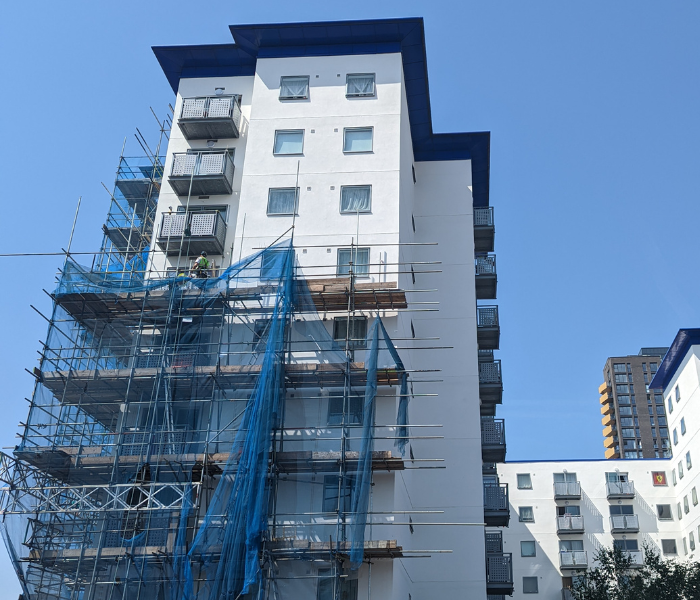New rules put in place after the Grenfell Tower fire have led to an increase in cladding remediation projects. But the cladding being removed is by definition combustible and in some cases hazardous, meaning this is specialist work requiring an experienced and trustworthy contractor.
Dangerous cladding: remove it without creating new risks
What is cladding remediation?
Remediation refers to removing and replacing any cladding that has been determined to be unsafe, generally in relation to fire risk.
Mostly, the cladding involved is aluminium composite material (ACM), which means sandwich panels – two layers of aluminium with another material such as polyethylene sandwiched in between to provide rigidity. ACM with a flammable core is now banned under the Building Safety Act 2022, as are some non-ACM historic cladding options. The ban includes dangerous cladding already in place, which must be replaced with less combustible material.
A series of government announcements have created various funds to assist with the cladding remediation obligations that are now law. Initial funds applied only to high-rise buildings of 18 metres in height, but the latest programme – the Cladding Safety Scheme – applies to all buildings in England of 11 metres or higher. Similar funds exist in other parts of the UK, and earlier funds will continue to apply to works already in progress, as well as to high rise buildings in London.
The importance of removing cladding correctly
One London-based contractor was fined recently for removing cladding unsafely during a job in Liverpool. On first visit, the HSE inspector noted that the combustible interior material had been exposed, heightening the very fire risk that requires panels to be removed. On a later visit, the removed material was found piled on balconies.
“Fire safety regulations continue to apply while you are in the process of remediation,” comments Terry Box, SHEQ Manager at Eden Facades. “In fact, additional requirements come into force during works. The guidance given to HSE inspectors includes detailed requirements for safe escape for workers on scaffolding, as well as mandating that flammable materials be removed directly and not stored on scaffolding or the building.”
Our team recently finished a cladding remediation project in Ipswich, Orwell Quay. Our Assistant Site Manager for the work, Harvey Michaelson, adds some detail:
“Before any remediation project, we hold an induction, so everyone on the site team understands the importance of not creating any new fire risk, and knows how to ensure that.
“Anything exposed has to be moved down to ground level without delay. We work with the main contractor, whose responsibility it is to have waste removed, so they know when this will be happening. Nothing would ever just be left on scaffolding.”
It is also essential that sufficient labour is present on site, to remove cladding materials without delay.
All combustible materials must be stored correctly
If any combustible material is to be stored, it must be kept safely. Guidance can be found on gov.uk, but in general, storage is not needed, the key being to get the removed material to an appropriate end-of-life facility as quickly as possible.
Once removed, cladding must be disposed of appropriately
In many older composite panels, Ozone Depleting Substances (ODS) such as CFCs and HCFCs are present in the central material. This will cause the panel to be classified as hazardous waste, the rules involved centring on a need to dispose of it in a way which does not release any ODS into the atmosphere.
Put your trust in a responsible, specialist sub-contractor
Eden Facades is an experienced and respected specialist sub-contractor, regularly asked to take on cladding remediation projects. As well as the project in Suffolk discussed by Harvey, recent examples include Renaissance and Baroque Court in London, and OrbisEnergy in Lowestoft.
If you need a responsible and skilled re-cladding partner, please get in touch on 01268 744199 or office@edenfacades.co.uk, or via our contact page.

